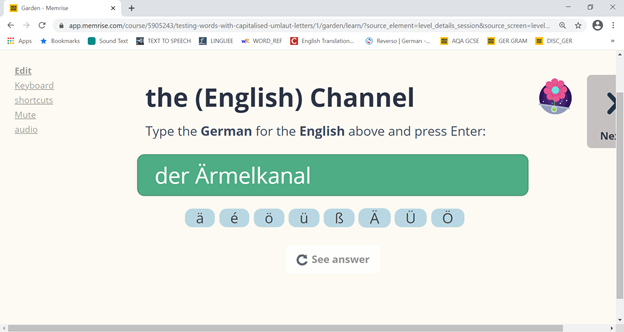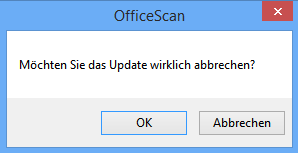When editing your course, edit the target column. There, go to the Testing tab which is where you can find the options for providing a specific keyboard and/or specific letters:
Thanks, that worked!
Thanks so much for doing this and for responding so quickly! Made me smile!
Thanks for doing that! I’m new and posted in the wrong place.
Hi, it seems that the default ‘German’ Keyboard Characters can not only be selected, but can also edited by a course creator to include the capital letters Ä, Ö and Ü. I think this is what was being discussed above, and here are the results from some quick tests I just did.
Before (i.e. the default character set):
After editing:
Before (i.e. the default character set):
After (using the new Keyboard Character Ä )

Hi @memrisesupport, please could consider arranging for the set of default umlauted characters to be edited to include capital letters Ä, Ö and Ü? Thank you considering this potential improvement!
*https://app.memrise.com/course/5905243/testing-words-with-capitalised-umlaut-letters/
Hey, do you use a specific source to extract the duolingo words for every lesson, or do you just do the lesson and find all the words? I’m trying to make a course modeled over yours but for the new German tree (the cefr aligned one) and I’ve been using duome to list the words but it seems a bit inconsistent.
Any tips/help would be really appreciated, what you did with the original course is so impressive!
What we did with the course was initially merge the words from separate Duolingo courses on Memrise that various other people created. Then we update and check each lessons manually and painfully so they correspond to what’s in Duolingo.
I didn’t do it alone, a lot of people helped and it took quite a while to reach the current state.
Level 8 (Adjectives: Predicate 1) is missing the words kurz and stark.
Also, the meaning for the word klar is currently “clear (everything that can be seen through - either physically or that you can grasp with your mind)”. Maybe this can be expressed more succinctly with “transparent, clear, free of ambiguity/doubt”?
Thanks, updated.
I was just curious, in for example Level 18 (Places 1), the plural of some words is included, but not of every word.
Is there any particular reason why the plurals of some words are not there? Are they very straightforwardly formed from the singular, perhaps? (And if so, in what can I know the plural from the singular form?)
As I am going throught the Duolingo course and this Memrise course in parallel, I’m encountering some words in Duolingo that are not in the corresponding Memrise lessons. I’d thought I’d list them here:
click to expand list of things
Level 23 (People 1)
- der Mensch “human” (and its plural die Menschen “people”)
Level 24 (Questions 2)
- woher “from where”
- womit “with what”
Level 25 (Family 1)
- das Verhältnis “relationship, affair”
Level 27 (Numbers 1)
- die Nummer “number”
Level 28 (Food 2)
- das Menü “menu” (synonym of die Speisekarte)
- der Kuchen “cake, pie”
Level 29 (Dative Case & Dative Pronouns) has das Trinkgeld which belongs to level 30 (Money).
Level 31 (Family 2)
- die Cousine “female cousin” (as opposed to der Cousin which only refers to a male cousin)
Level 34 (Travel)
- to match the order in the Duolingo tree, this level should come after Level 36 (Shopping)
- wandern “to hike, to wander, to migrate”
- das Taxi “taxi”
Level 38 (Colors)
- die Farbe can also mean “paint”, in addition to “colour”
Level 40 (Occupations 1)
- der Beruf currently is said to mean “occupation”, I would suggest to set the meaning to “occupation, profession” to disambiguate between the different meanings of the word occupation
Level 41 (Prepositions)
- untergehen “to sink, to go down”
Level 46 (Household 2)
- zusammen passen “to match”
Level 48 (Adjectives: Predicative 2)
- ausgezeichnet “excellent”
Level 50 (Adjectives: predicative 3)
- bekanntgeben “to announce, to make public”
- offensichtlich “self-evident” (synonym to selbstverständlich)
Level 53 (Verbs: present 2)
- ausmachen “to mind” (in the sentence Ich hoffe, es macht Ihnen nichts aus)
- aufstehen “to get up”
- einschließen “to include” (in the sentence “Wir schließen Brasilien mit ein”)
- annehmen “to assume”
Level 56 (Verbs: Future 1)
- sich merken “to memorize, to remember”
Level 57 (Feelings)
- im Ernst “seriously, no kidding”
- Spaß machen “to be fun”
- immer mit der Ruhe “take it easy”
- sein Ernst sein “to be serious”
- (keine) Lust haben “to (not) want to, to (not) feel like something”
- Glück haben “to be lucky”
- ganz schön “quite (used adverbially)”
Level 58 (Time)
- die Uhr lesen “to tell time”
Level 59 (Frequency)
- je “ever”
- mal schauen “let’s see” (“lass uns mal sehen” is also accepted by Duolingo)
Level 60 (Modal Verbs)
- ersetzen “to replace”
- ins Bett gehen “to go to bed”
- das kannst du laut sagen “you can say that again”
Level 61 (Adverbs 2)
- sowohl…als (auch) “both…and”
- weder…noch “neither…nor”
Level 63 (Occupations 2)
- der Autor “author, writer”
Level 64 (Verbs: Perfect 1)
- schlafen gehen “to go to bed”
- sein schlafen gegangen “gone to bed (past participle)”
Level 65 (Adjectives: Nominative 1)
- Asien “Asia”
Level 115 (Idioms)
- der Meister “master, champion”
- der Tropfen “droplet”
- das Fass “barrel, keg”
Hi, in the Future 2, “abbrechen” is defined as “to break off”, but in the Duolingo skill, it’s used as “cancel”. Would you be willing to change or add this definition to that term?
abbrechen - break off
is fine. It corresponds to English - to break off (an engagement) as well as to break off a piece of something.
German has a lot of verbs for cancel with different levels of registers.
absagen - to cancel
abbrechen - to cancel
abstellen - to cancel
I understand that, I just wanted it to correspond to how it was being used in Duo, since it’s a Duo course.
I rather not change it based on Duo’s definition, regardless of it being a ‘‘Duo’’ course. to cancel as a translation for abbrechen is uncommon and is probably not the register you are thinking of. And I have doubts about Duo’s accuracy from what I have seen in the past. Could you provide a sentence that Duo has used abbrechen in?
EDIT: I’m going to update it as - to terminate or discontnue somethin
I know there were a couple, but I don’t remember them all. I’ll have to finish the level to get back to it. The only one I remember won’t help much: “Wirst du abbrechen?” I think it was.
to cancel as a translation for abbrechen is uncommon and is probably not the register you are thinking of
Don’t computer dialog boxes in German have OK/Abbrechen where English has OK/Cancel?

The tree got a major update, lots of new levels and possibly also new words in old ones.
Thanks for creating and maintaining this course. Duolingo have replaced the German tree with a new path. Are there any plans to update this course to reflect the changes?
